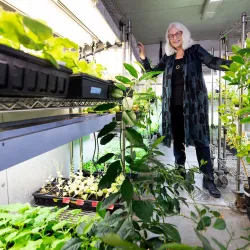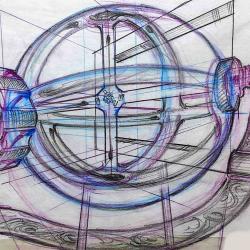UMD Quantum Computing Startup IonQ Raises $20 Million Series B Round
Company aims to bring quantum computers to market by late 2018
IonQ, an early-stage company developing quantum computing for commercial applications, recently completed a $20 million series B round led by New Enterprise Associates (NEA) and GV (formerly Google Ventures), with participation from new strategic investors. The College Park, Maryland-based company plans to bring general-purpose quantum computers to market by late 2018.
IonQ’s technology builds on the pioneering work of its co-founders: Chris Monroe, Distinguished University Professor and Bice-Zorn Professor of Physics at the University of Maryland, and Jungsang Kim, professor in the Department of Electrical and Computer Engineering and the Department of Computer Science at Duke University.
“Efforts to harness quantum mechanics to accelerate computation have gained tremendous momentum in recent years, fueled by significant scientific progress and growing interest—and investment—by some of the world’s largest governments, organizations and technology companies,” said David Moehring, CEO of IonQ. “While there is much yet to be discovered about specific applications, there is a massive market clamoring for practical quantum computers. Building on the groundbreaking work of Chris Monroe and Jungsang Kim, IonQ’s mission is to make reliable, scalable quantum computing a reality.”
Quantum computing represents a radical departure from classical computing and has the potential to overcome these limitations by embracing uniquely quantum phenomena, such as superposition and entanglement, which emerge at the atomic scale. Quantum computers’ ability to perform incredibly complex calculations and data processing exponentially faster than classical computers opens up a world of possible commercial and scientific applications. Scientists anticipate that the technology will transform industries and facilitate breakthroughs in areas including machine learning, molecular interaction simulation, cryptography, financial analysis, logistics optimization and “big data.”
Ion trapping is the hallmark of IonQ’s approach and a key differentiator from other efforts underway. Most large technology companies initiating quantum computing research attempt to leverage their core semiconductor technology by developing superconducting qubits. IonQ believes trapped-ion technology, which uses lasers to cool and isolate individual ions, will prevail because trapped ions are identical, more stable, can be better controlled, and are therefore likely to scale with better performance and greater predictability.
“Quantum computers are the next giant leap in the ability to process information, and IonQ’s promising approach builds on nearly two decades of research by highly regarded physicists and engineers in the field,” said Blake Byers, general partner at GV and a member of IonQ’s board of directors. “Quantum computers have the potential to solve data-intensive problems in areas like health care, machine learning and cryptography, and we're excited to partner with IonQ as it accelerates development.”
IonQ’s team includes some of the world’s foremost experts in the field of quantum computing. Monroe and Kim are longtime collaborators, well-known for their pioneering work in ion-trap experiments. They also maintain large academic research groups with combined government funding of approximately $10 million per year. Moehring, who joined as CEO in 2016, was most recently at the U.S. Intelligence Advanced Research Projects Activity (IARPA), charged with oversight of government-sponsored quantum computing initiatives.
“There is simply no team in the world with more expertise in trapped ion technology or with greater understanding of the broader quantum computing landscape,” said Ron Bernal, venture partner at NEA and a member of IonQ’s board of directors. “We are incredibly excited to partner with Dave, Chris and Jungsang as they advance the field of quantum computing and develop a platform for its commercial applications.”
IonQ has raised approximately $22 million in total, with an earlier $2 million invested by NEA in 2016. The company has demonstrated significant momentum over the last year, adding several new board members and strategic advisors, expanding its product development team, and attracting growing interest from both the scientific and startup communities. In addition to Bernal and Byers, new board members include Jeong Kim (Ph.D. '91, reliability engineering), former president of Bell Labs, and Andrew Schoen, principal at NEA. John Preskill, director of the Institute for Quantum Information at Caltech, and Jagdeep Singh (B.S. '86, computer science and economics), founder and CEO of QuantumScape, Lightera Networks, and Infinera, are serving as advisors to the company.
Media Relations Contacts: (IonQ) Mahsa Dornajafi, Director of Operations, 301-298-7997, dornajafi@ionq.co; (NEA) Kate Barrett, 301-272-2318, kbarrett@nea.com; (UMD) Abby Robinson, 301-405-5845, abbyr@umd.edu
University of Maryland
College of Computer, Mathematical, and Natural Sciences
2300 Symons Hall
College Park, MD 20742
www.cmns.umd.edu
@UMDscience
About the College of Computer, Mathematical, and Natural Sciences
The College of Computer, Mathematical, and Natural Sciences at the University of Maryland educates more than 7,000 future scientific leaders in its undergraduate and graduate programs each year. The college’s 10 departments and more than a dozen interdisciplinary research centers foster scientific discovery with annual sponsored research funding exceeding $150 million.







